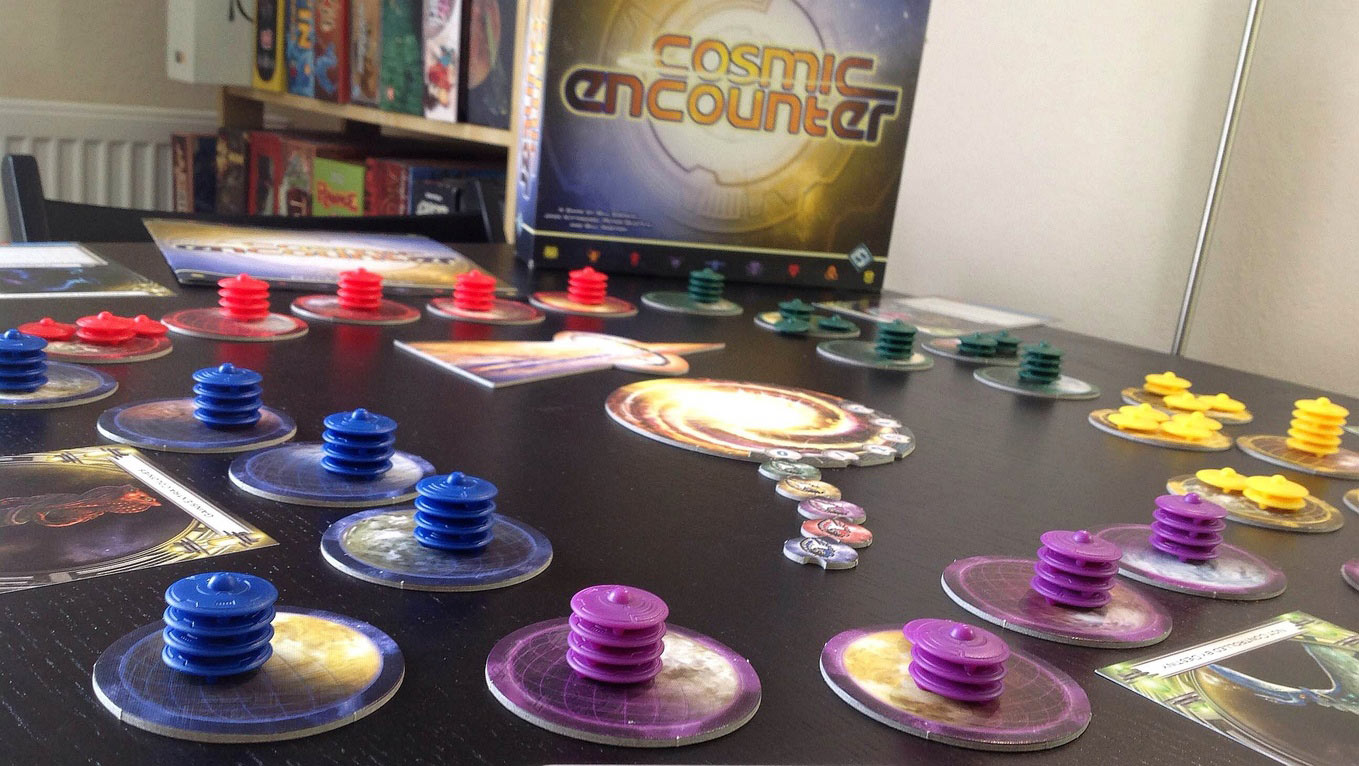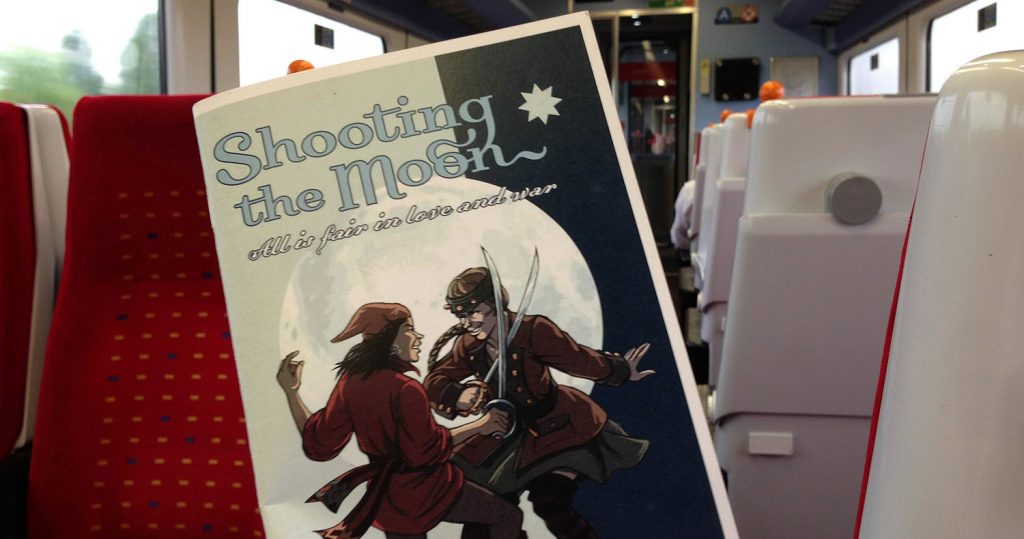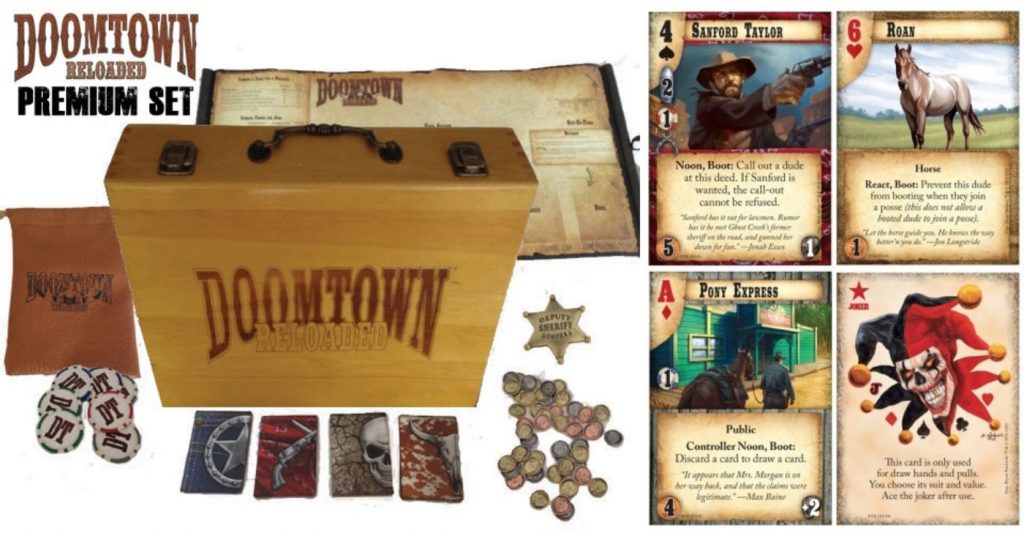Paul: BoardGameGeek is a titan of the board game scene, one of the most comprehensive and consulted sites the hobby has, as well as a place to which we owe a huge debt of inspiration. It’s also home to the absolute Board Game Geekiest among us, namely those with a monthly allowance for small zip-lock baggies. While we undoubtedly fall into that category too, we appreciate that not everyone does and it’s inevitable that our opinions will diverge, right?
Just what do we make of those most esteemed of titles that are forever locked in an eternal battle for a place in BGG’s Top 100 rankings? This week, we’ll be giving an extensive, nay, exhaustive breakdown of that list, telling you what we’ve covered, what we thought and even admitting what we’ve missed out on. So come with us as we count down the games in a whole week’s worth of analysis and adventure!
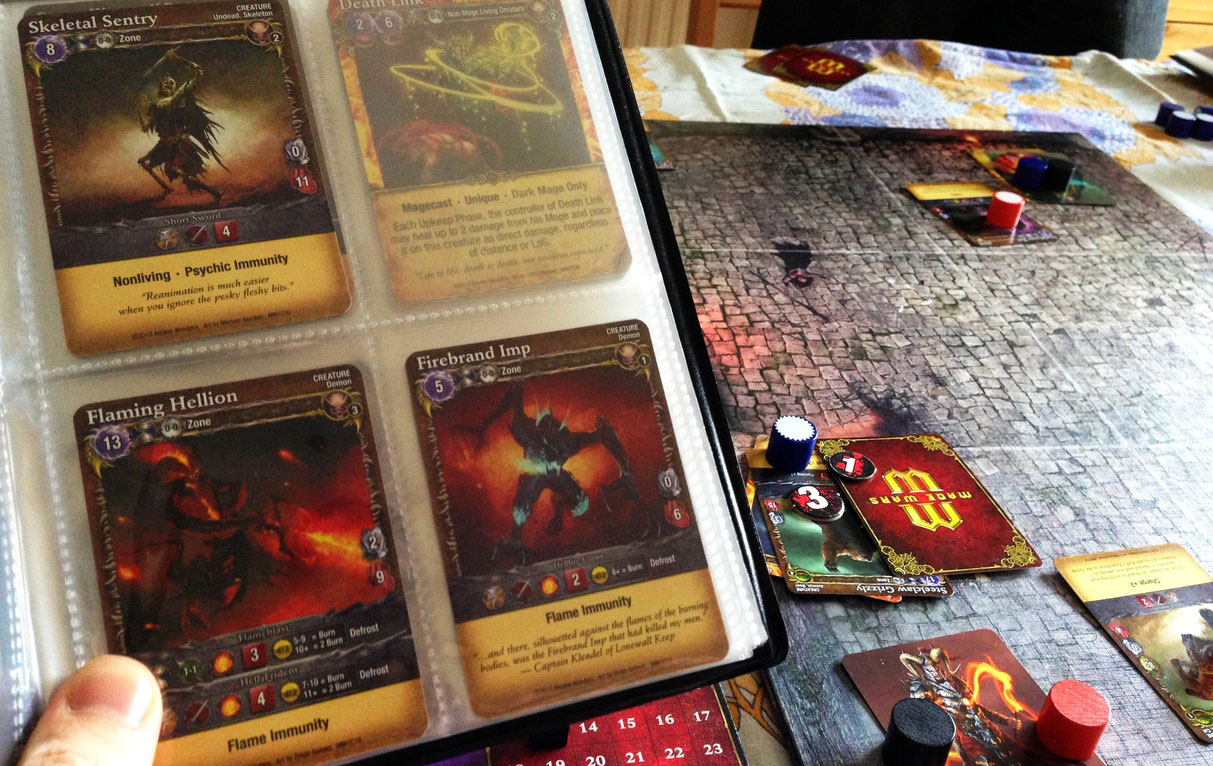
#101: MAGE WARS ARENA ![]()
Review here
Quinns: Yes! We’re starting our top 100 list a little early with number 101, because this game is enough fun that we’d feel bad leaving it out. We’ve not followed the various releases and expansions of Mage Wars since our initial review, but people should know that (a) I still consider this game as pleasingly crazy as the day I first played it, and (b) it’s now available as a more affordable starter set titled Mage Wars: Academy.
What we said:
Quinns: If this game sounds absurd, it’s because it is. Last night my Warlock summoned a lumbering greater plague demon that was so tough I was able to use the magical equivalent of a riot hose to help push it towards my opponent. It was awesome. I’ve had a beta key for Hearthstone in my inbox for weeks. I have no intention of touching it until it lets me enchant a ferret with the strength of a bear, creating an enemy so deadly that my opponent, who has conquered cities and commanded armies, has to put it to sleep and run away.
That Mage Wars has a sense of humour on top of everything else almost feels like too much. This is just a board game that gets absolutely everything right. Even the little things, from a straightforward manual, to an “apprentice game” with half the rules, to attack values being represented not by a modifier to a die but how many dice you throw. Oh, and then make those dice large and bright red.
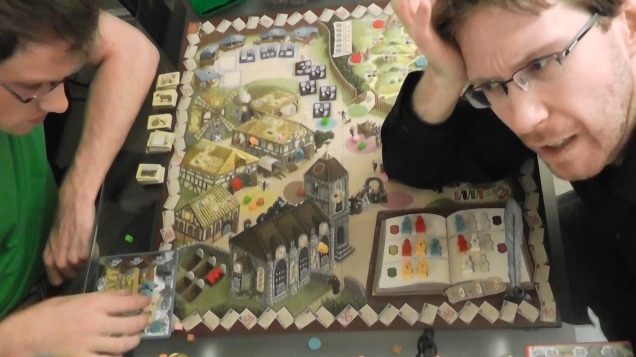
#100: VILLAGE ![]()
Review here
Paul: Ah the beautiful and bucolic Village, a game of building a family and its saga, across generations, of small-town drama, of simple lives lived to the full, of… plague and sudden death and back-breaking labour and HANG ON, Village is actually kind of gruesome and cruel.
In fact, I’d forgotten just how mercenary and unpleasant this unique and genius take on worker-placement can be. Not only are you assigning family members to the church, to jobs, to long journeys far afield, you’re ever-aware that they’re constantly aging and can only give you so much of their lives before they’re gone forever. Village is a remarkable game that not only constantly challenges you, it also repeatedly reminds you of how tough and uncompromising a Middle Ages life must’ve been.
What we said:
Quinns: It somehow simultaneously really quaint and really grand. It’s complex strategy, but it’s easy-going strategy and by the end of the game, you have a saga.
Paul: You can have lots of kids and then kill them all off.. Like a spider. Or send them all away to a monastery in corruption of the institution of worship. Or just keep your parents at home and then send the kids into town and run a kind of a sweatshop where you have them all making wagons…
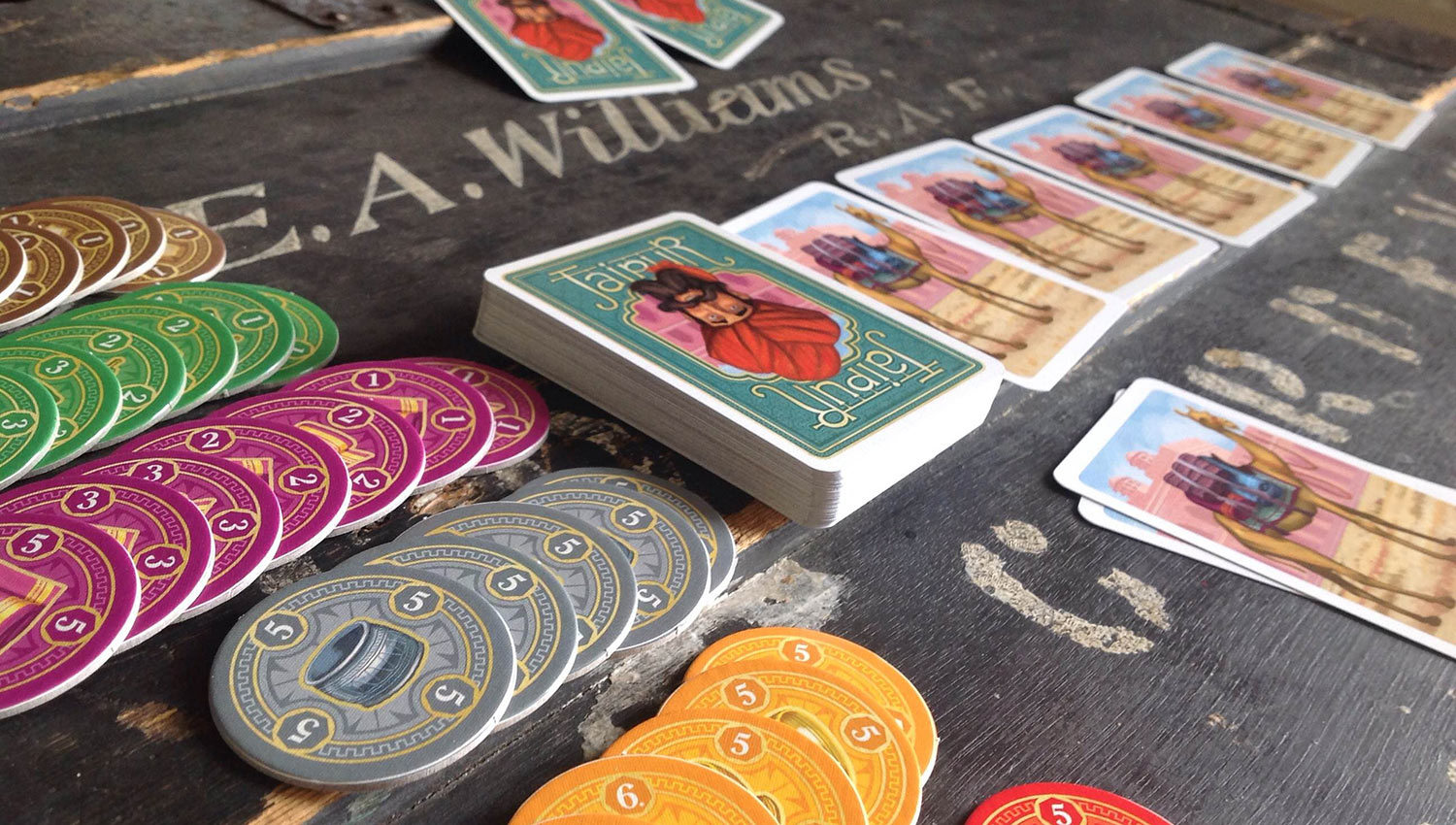
#99: JAIPUR ![]()
Review here
Quinns: Three years on from our review, I’m happy to report that Jaipur is still in my collection. Like a toddler with a problem, I’ll take any excuse to whip out this little box of mine and show it to the world.
Oh god, what am I saying. We’re only at number 99 and I’m already going mad. Abort the feature!
What we said:
Quinns: I’ve got to say, we’ve reviewed a lot of great economic card games on SU&SD. Splendour, Machi Koro, Mundus Novus. And they’re all nice! They’re so nice. But Jaipur is the first one that I think I can say I love. Only partially because of those others games’ inflexibility- Splendour will always be tough, Machi Koro’s always silly, Mundus Novus is the definitive breezy card game.
Jaipur? It’s just good. It’s so good. It’s as if it tucks you and your opponent into the same pair of trousers. You’re in such tight proximity that every single move you make will either excite your friend or have them screaming at you.
Brendan: That’s disgusting. But yes, I see what you mean. I’m not one for games that involve a lot of itty-bitty arithmetic but Jaipur never really feels like that. It feels more like a traditional card game, like Rummy or something, in that your opponent’s move will always have a huge effect on what you are trying to accomplish with your own hand. The ‘luck of the draw’ feeling of trad card games is also there, and the old adage of what you do with your luck. I think that makes it not only a great game for seasoned vets but also something you could easily introduce to people who don’t play a lot. Folks who would frown at something heavier.
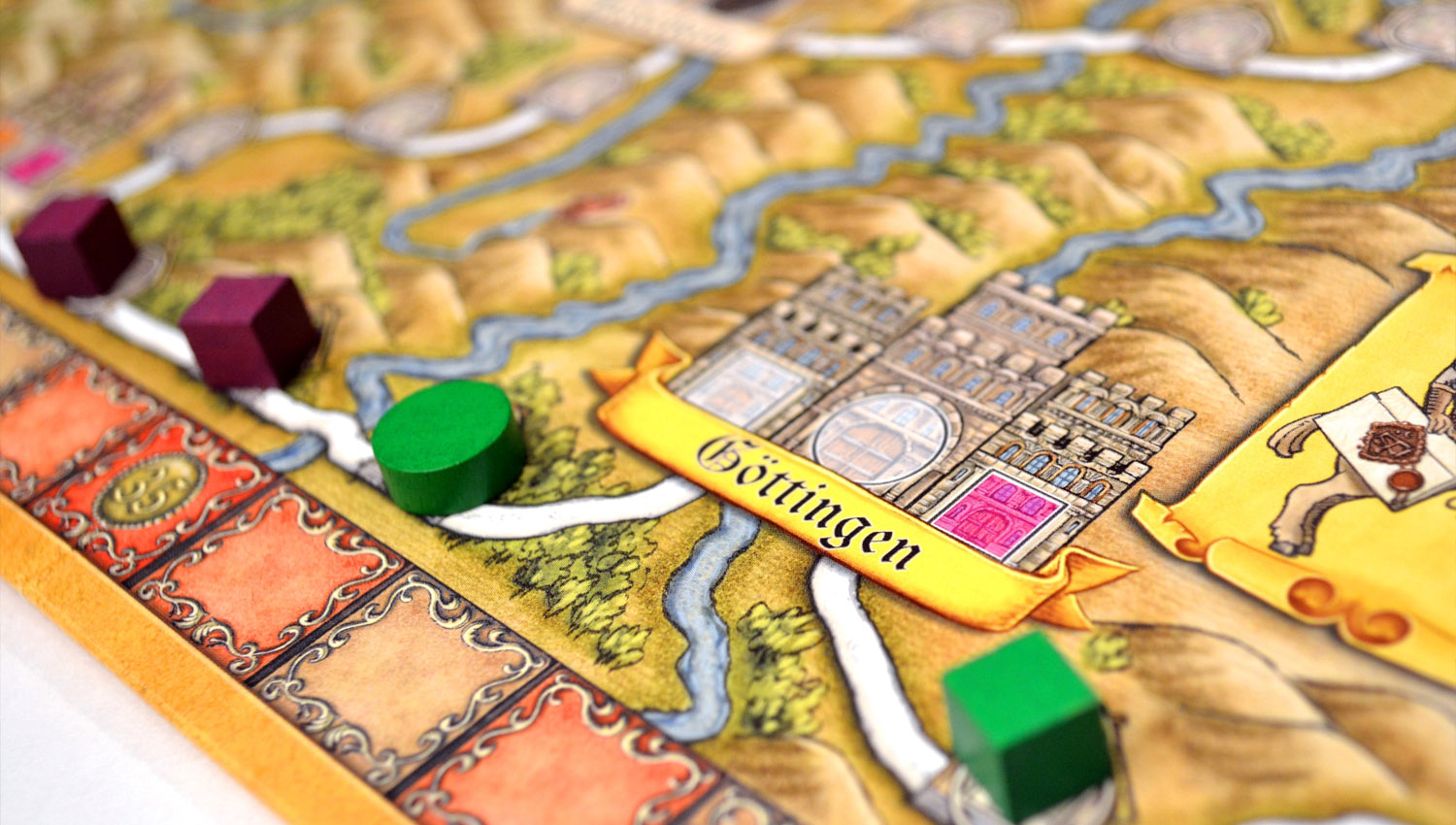
#98: HANSA TEUTONICA
Paul: When people ask us if we know of the “legendary Hansa Teutonica” it’s the sort of question that has a person doing a double take. Who is Hansa? What games have they made? Did we meet them at a convention and then forget who they were? But no, this actually is a game, another one based around that ever-popular concept of Renaissance-era trading and economics.
Across a map of twisting trade routes, it tasks you to expand and empower a trading company, linking towns together to make money, but balancing that trading with improving your own infrastructure. Do you rush to link another two settlements, or spend your efforts supplanting someone else, earning yourself more actions and the ability to open offices in new types of town?
This is not a game we’ve had a chance to try yet and, I have to admit, it’s never been at the top of our to-do list, either. It looks so terrifically morose compared to so many of its route-building and trading peers (not least Ticket to Ride!). Even the man on the box looks kind of miserable. All these years on, is it something we should really go back and revisit? What do you think?
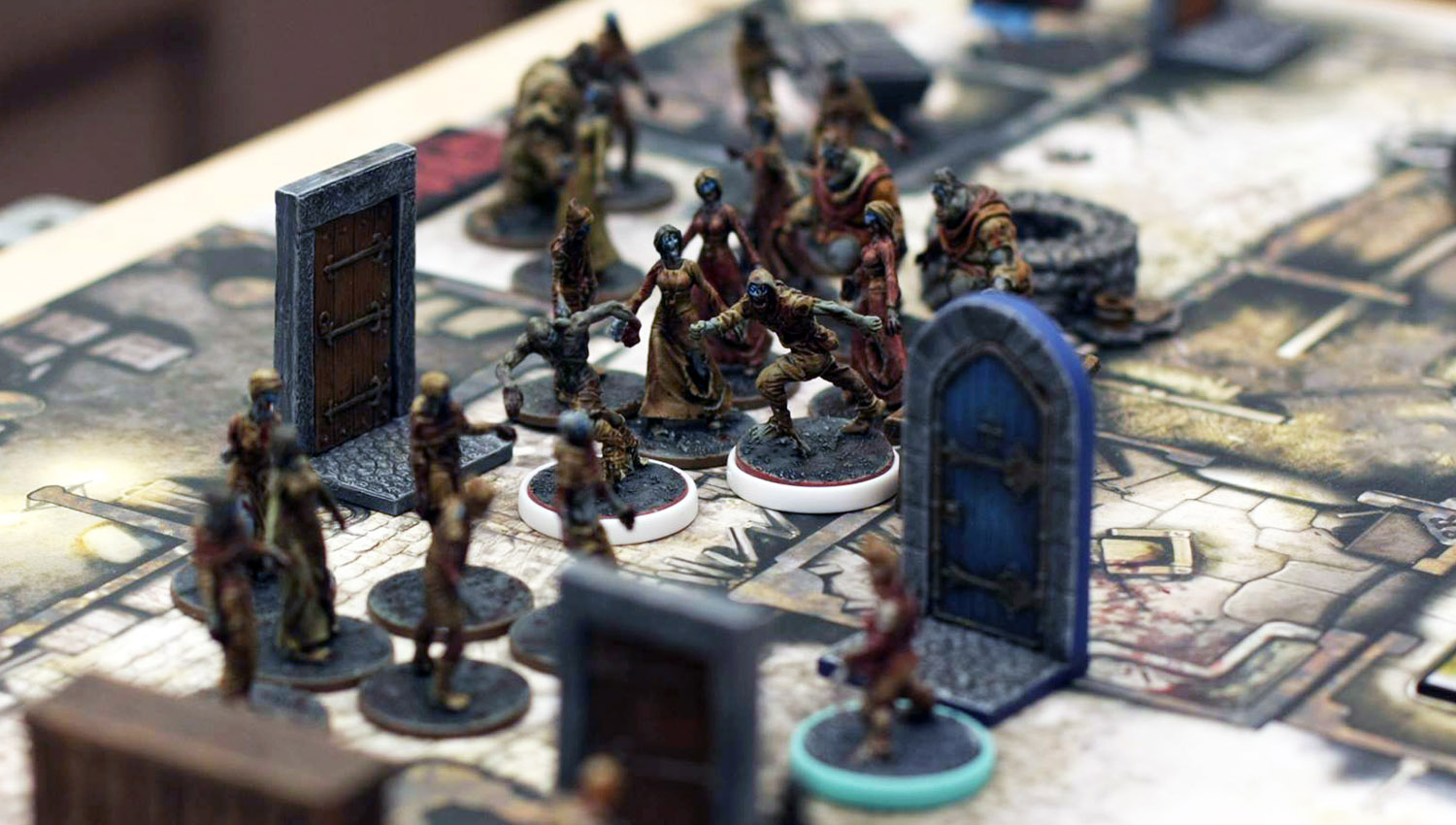
#97: ZOMBICIDE: BLACK PLAGUE
Quinns: Not only has SU&SD not reviewed Zombicide: Black Plague, the medieval sequel to Zombicide, we never found the time to review the original Zombicide!
Now, I don’t want to get too technical for people to follow, but there’s a highly scientific reason why that is. Literally everyone we trust who played it said it was a bit shit.
But who am I to judge! I’m just one guy, sat at his computer, who happens to have noticed that this game is ranked 296 places higher than bloody Chess.
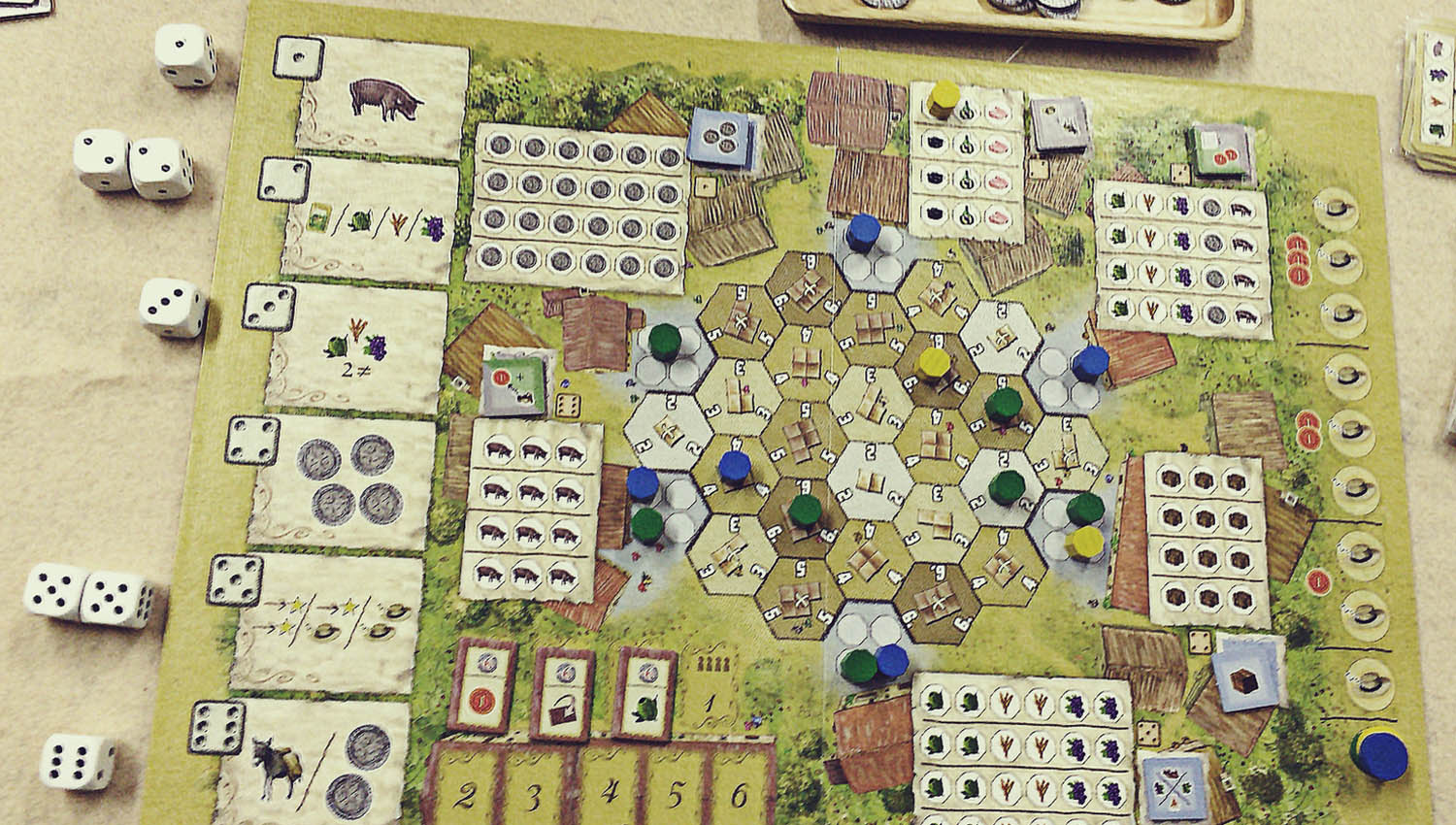
#96: LA GRANJA
Quinns: Ah! OK, we haven’t reviewed this one but I did play La Granja (Spanish for “the Granja”) earlier this year to see what all the fuss was about. It’s a very clever engine-building game where players run Spanish farms, making careful use of the cards in their hands, producing and selling resources in clever ways and… erm… did I mention it was clever? It’s certainly clever.
Come to think of it, I had the same response to La Granja as Paul did to Terraforming Mars (another game we chose not to review). Both are involved and clever engine-building games, but these days if you want a complicated management game you could buy one where players are actually interacting, like Food Chain Magnate, or one that looks exciting, like A Feast for Odin, or a little bit of both, like Great Western Trail. Or if I want clever cardplay in my resource game I’ll turn to Race for the Galaxy, an absolute classic with a magnificent theme!
I guess these days games needs to succeed in a couple of areas to impress us. They need to look good and feel good, or be innovative and accessible. That kind of thing. Otherwise it can’t hope to compete against the year’s biggest and most bruising releases.
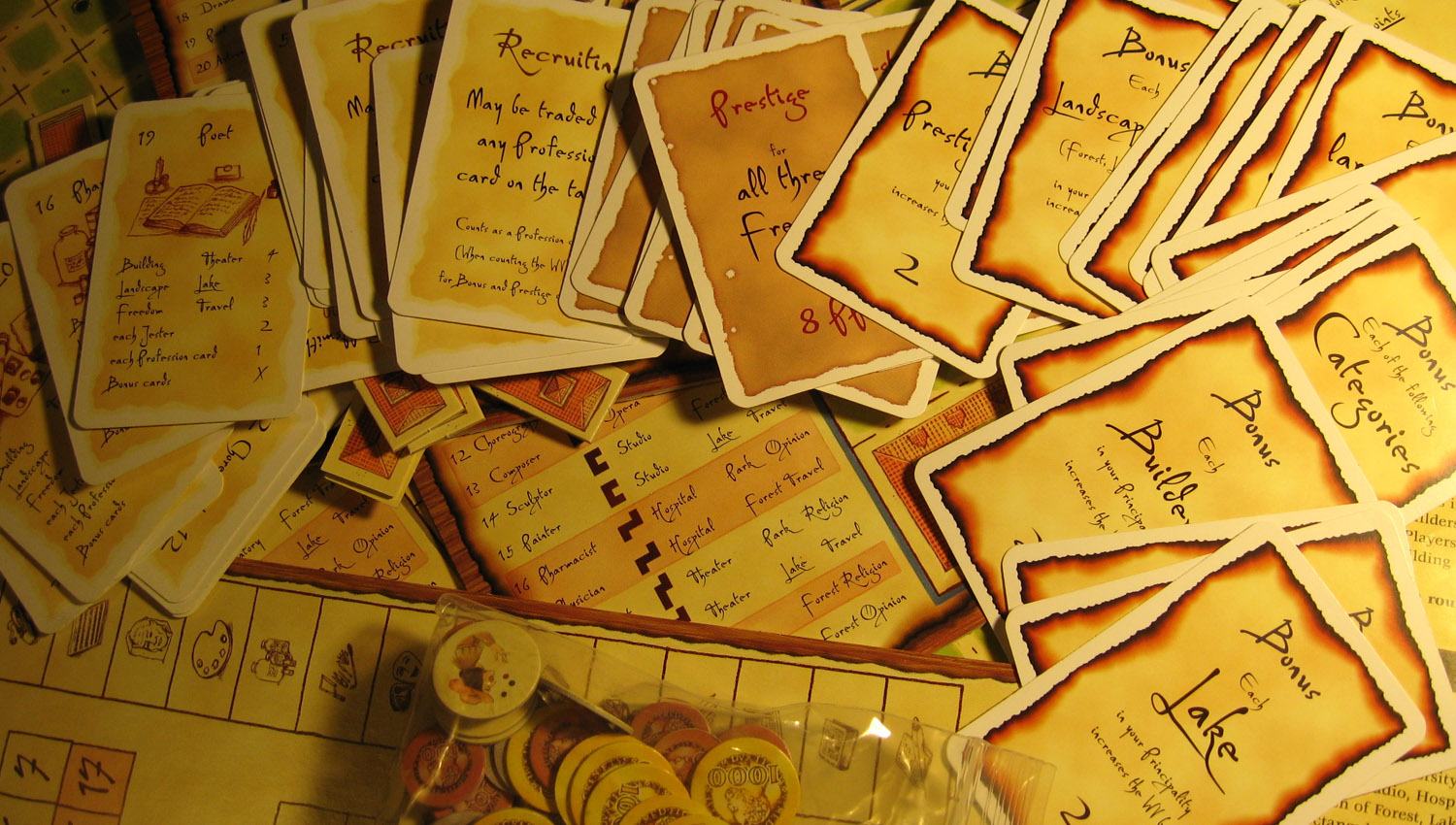
#95: THE PRINCES OF FLORENCE
Paul: This takes us all the way back to the year 2000, practically ancient history as far as the board gaming scene is concerned and, it seems, almost as distant from us as the famous Florence of old. I can barely remember what I was doing in 2000 now. Dribbling, probably.
The Princes of Florence is all about putting together the most attractive palace that you can, in which you hope that all manner of scholars and artists will frolic happily, drawn to the beautiful and enriching environment you’ve created for them. As anybody knows, a happy scholar or artist is likely to create something of value and then, as their prestigious patron, you can profit from the wonderful works they’ve wrought. It all looks a little too pastel and a little too prosaic to us now, but it’s easy to see how this must’ve been such an influential title in its time, with all its bidding, tile-laying and (again) slightly grumpy looking Italians.
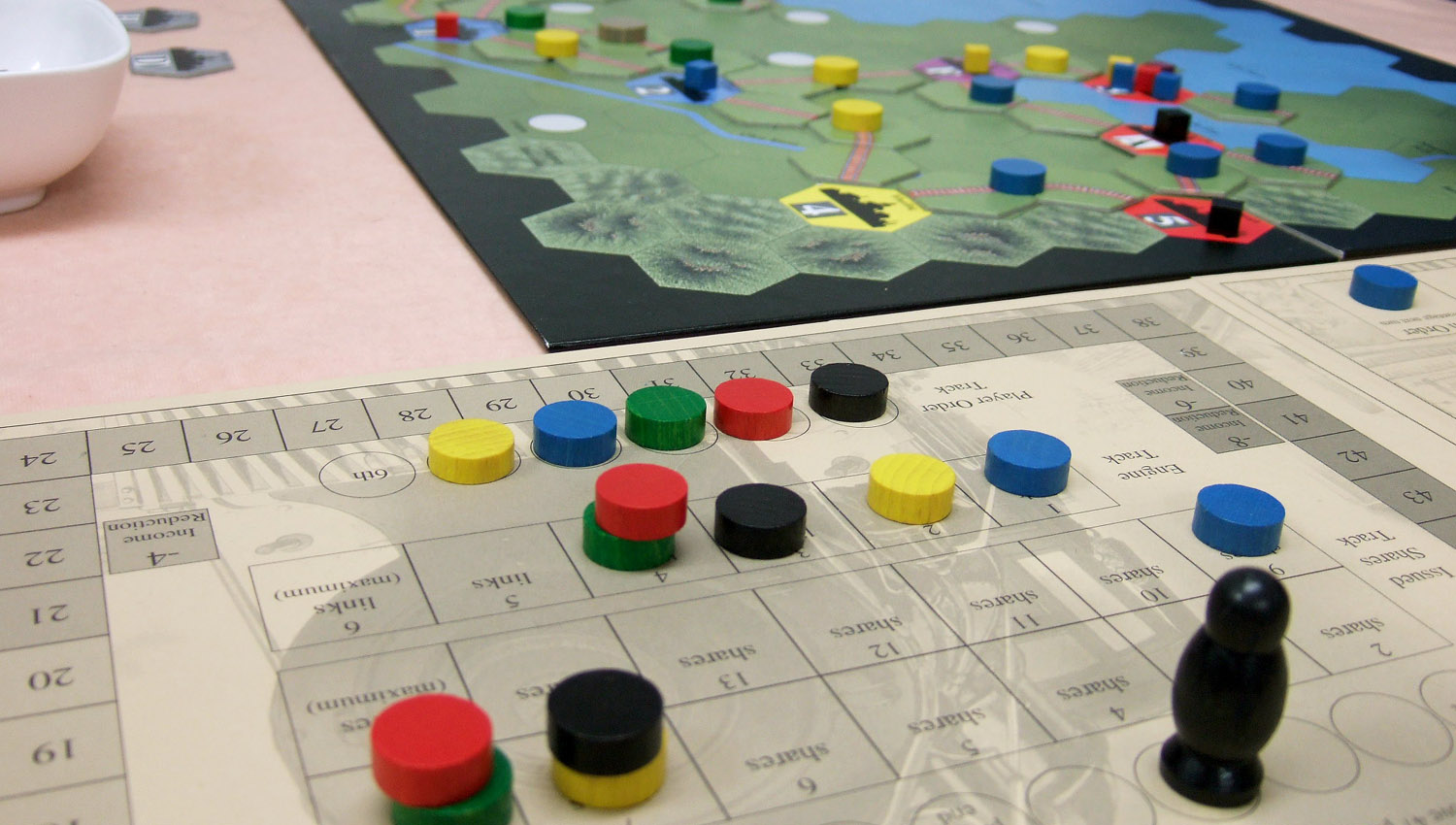
#94: AGE OF STEAM
Matt: The first of many games in the BGG Top 100 that we haven’t reviewed on the account of the fact that no-one on the team is hugely into trains. I’ve been on a lot of trains in my life – and I’m certainly thankful that they exist – but the board game community’s long-standing reverence to the mighty titans of carriages and tracks has left us somewhat cold and puzzled in the face of this adorable, harmless obsession.
Age of Steam plays out the historical era in which cut-throat American Business-Boys (Bu-Boys) raced to set up lucrative routes around the American “Big Big West”. Regarded by some as the ultimate train game, Age of Steam’s drab hexagonal world offers players the freedom to build their own routes from scratch, evolve towns into cities like concrete Pokémon, and generally do things that are related to trains in a way that will likely please people who like trains.

#93: SPLENDOR ![]()
Review here
Paul: Oh boy. Years later, Splendor is still like the most dangerous of drugs to me and not only do I want to play it yet again, the moment you mention its name, I WON’T WANT TO STOP AFTER THAT FIRST GAME. This is a brilliantly simple and yet also very devious game of engine-building, where you use gems to get gems mines that give you more gems in the hope that you can eventually afford the most prestigious gems and be the gem giant who rules the table.
And of course this isn’t anywhere near as simple as it sounds. It requires carefully balancing your resources, perfectly timing your purchases and, if you can, deviously denying your opponents the cards that they want. Splendor is one of those rare, genius games that takes a few moments to learn, but a lifetime to master.
What we said:
Quinns: This gemstone theming isn’t so ridiculous after all, because this game is as tiny, as hard and as hypnotising as a diamond.
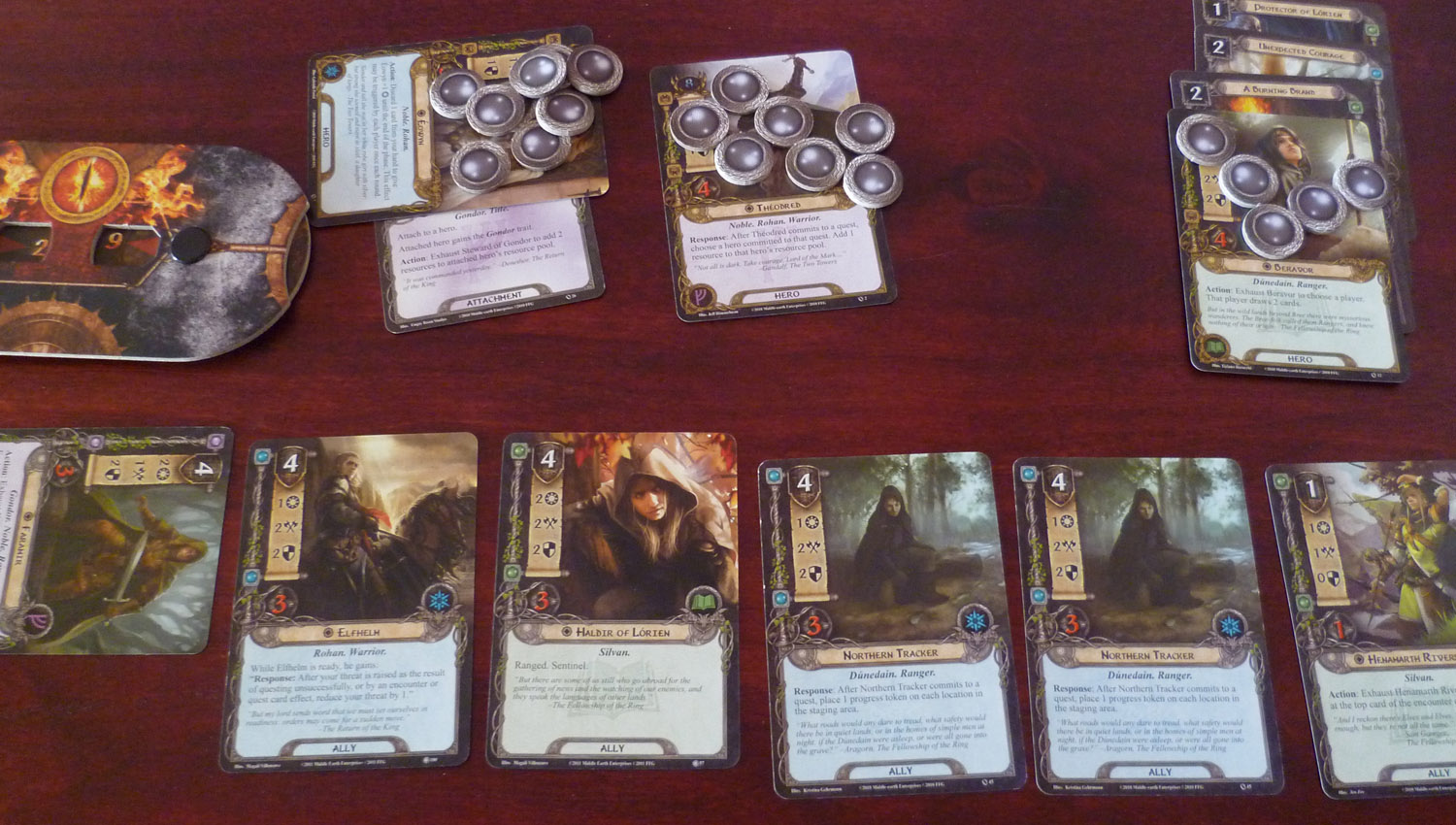
#92: THE LORD OF THE RINGS: THE CARD GAME
Quinns: Hmm. On reflection, this excellent co-operative card game from Fantasy Flight got a bit of a raw deal from us. I played it, enjoyed it, and then promptly never reviewed it or wrote about it ever. In my defense, back then SU&SD wasn’t a paying gig and we would film reviews in between our paying gigs as freelance writers and recovering potatoes from the neighbour’s bins.
I like to think that we’ve corrected our karma now, though, with the release of the co-operative Arkham Horror Card Game. In a lot of ways that game is the sequel to this one, and we wasted no time in awarding it a glowing review.

#91: GOA
Quinns: I’ve literally never heard of this game. It looks like something that Matt would knock up in photoshop in an attempt to create the world’s most generic board game. In fact, I’m not entirely sure this isn’t a trick he’s playing on me.
Hmm. OK, apparently Goa is real, and it’s a 2004 game of auctions and resource management set in the “mild climate” of Western India that was re-released in 2012 by Z-Man Games.
I do like auctions a lot. I’m sure I’d like this game ok. Do you think I’d like Goa, readers? The place or the board game? Answers in the comments, please.
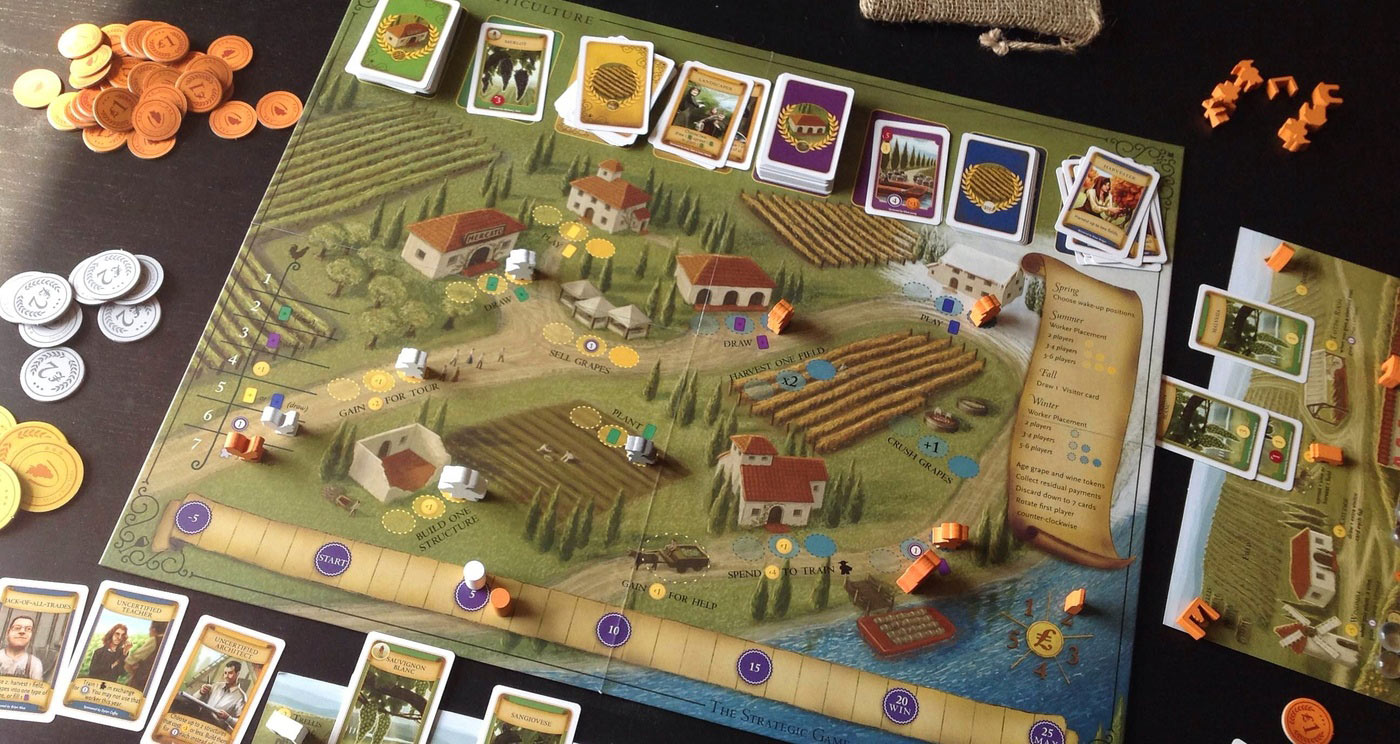
#90: VITICULTURE
Review here
Quinns: Fun fact! Viticulture is the first published game from Jamey Stegmaier, the designer and publisher of board gaming heavyweight Scythe. Looking back, I now see that just as Paul found Scythe to be good but not great in his 2017 review, I found Viticulture to be good but not great in my 2014 review. Paul and I may be separated by an ocean and a continent, but our psychic link remains strong.
What we said:
Quinns: This is a fine game, made with love, and if you and your friends are after some intense, impersonal strategy, Viticulture will be as fine company as any bottle of wine.
But if you’ve only got the budget to buy games rarely? You’re just so spoiled for choice. I’d pick up Village or Keyflower for your slice of pastoralism, or if you wanted something brain-burny, I’d rather play Tzolk’in or anything by Stefan Feld.

#89: STEAM
Matt: Hang on wait no I already wrote this one. Oh god that was Age of Steam this one is different. Tell my family I love them, I am never coming home. Steam is very similar to Age of Steam and is also designed by the same man: Martin Wallace. I don’t want to suggest that the world of train games is controlled by some sort of shadowy cabal, but these dots do seem to be joining up quickly. In Steam you’ll also have to join things up quickly – that’s how you make train tracks and then win the game!!! Jeez guys don’t look at me like that, I didn’t invent trains I just ride them to victory.
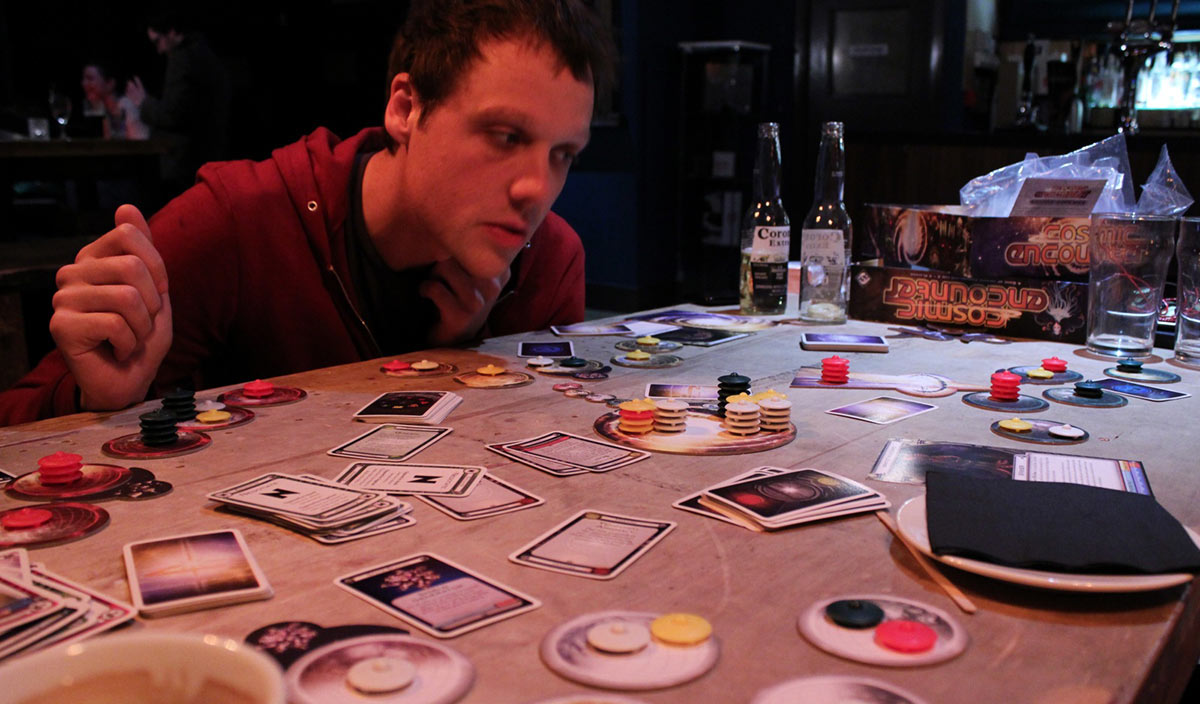
#88: COSMIC ENCOUNTER ![]()
Review here and our playthrough here
Matt: Injecting gloopy proof into the pudding that the popular vote doesn’t always elevate quality – Cosmic Encounter’s position in this list is shockingly low in the grand scheme of things. Poker chip spaceships! Intergalactic bluffs! Aliens that strike fear or laughter into the heart of all for miles. It’s so good that some weeks we’d frankly like to review it twice.
Paul: Is that such a terrible idea? We have filmed it twice, after all…
What we said:
Paul: Board games are a bonding experience, but Cosmic Encounter is particularly good for bonding. Partly because it tells tells a story – a story of warring races, or cosmic allies getting together. You can play this game with a complete stranger and see them a year later, and you won’t remember their name but you’ll remember the game. That’s a bit weird, isn’t it?
Quinns: Cosmic Encounter is a beautiful game, beautiful in spirit, beautiful mechanically, beautiful visually.
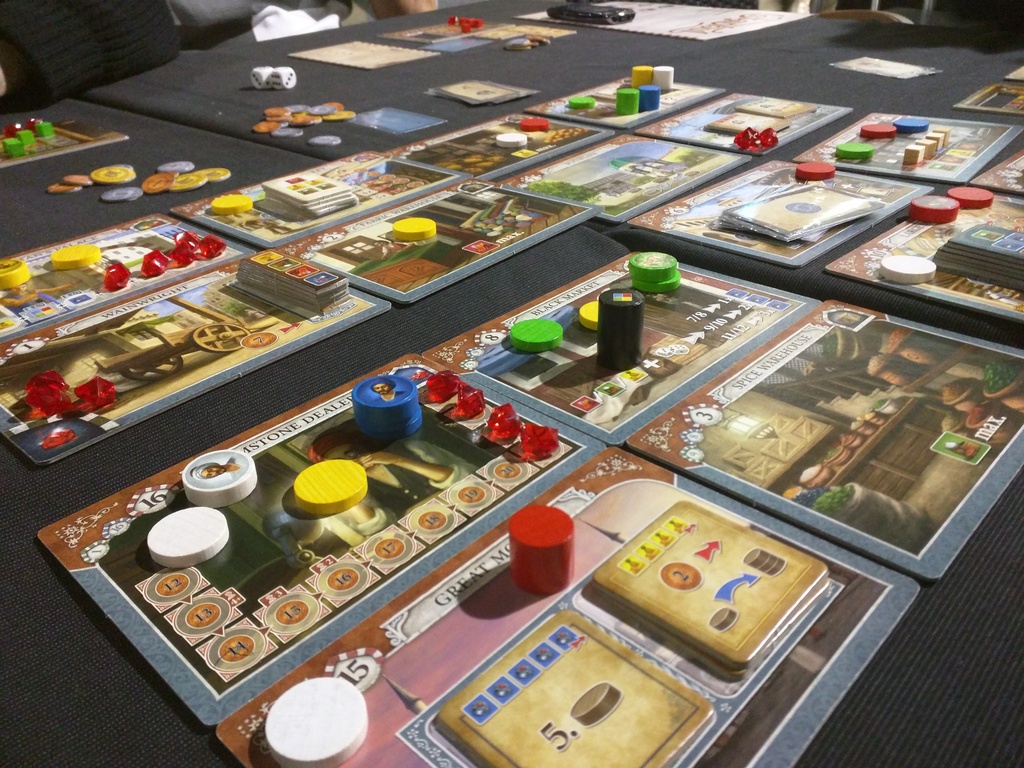
#87: ISTANBUL ![]()
Review here
Paul: Grrr.
Quinns: Paul loathes Istanbul, but the joke’s on him because I got to do our video review and I like it a lot. I haven’t played it since I published my review, but that’s always the way. To work for SU&SD is to keep one eye fixed on the horizon and a second eye peeping down towards what I’m reviewing this week. Most of the time this just looks like I’ve got a lazy eye, but you and I, sweet reader, we know the truth..
What we said:
Quinns: If you’re the kind of person who enjoys thoughtful puzzles to do with efficiency and ascribing value to resources, at the price – which is £15 lower than most board games – Istanbul is a must buy. SU&SD Recommends. Although Paul doesn’t like it, so I guess if you’re also someone who’s always late, maybe you’ll hate it too.
One more caveat. As a quick-playing resource management game, I don’t think it’s as good as Concordia. But then, what is?
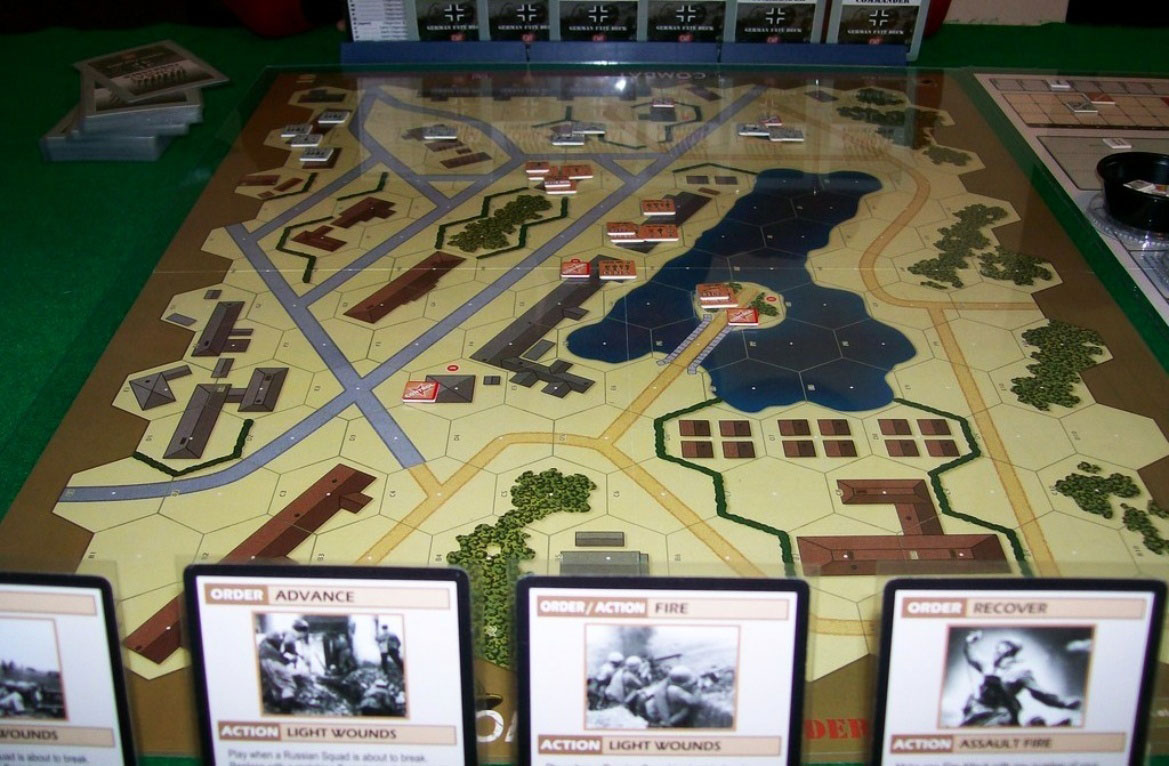
Review here
Paul: There are so, so many stereotypes about board games (and wargames in particular) being all hexes and cardboard counters, yet that just isn’t true. It’s mostly not true, anyway, but we have to admit that Combat Commander ticks every one of those Expectations boxes with a thick, permanent marker and… it doesn’t even care. We don’t even care. Because it’s still so damn good anyway.
This is no slow and sterile combat simulation, it’s a frantic and fast-moving depiction of squad-level combat full of all sorts of types unit and terrain AS WELL AS a random scenario generator that offers huge, near-infinite replayability. There is so much war in this box that you risk having your socks blown off. Don’t even think about opening it if you haven’t put your helmet on.
What we said:
Matt Thrower: The quick-fire play and innovative time mechanics of Combat Commander are hugely appropriate to conveying a sense of fast action. Too many of its peers play very slowly and reward intricate planning. They might be full of strategy, but that just feels wrong when you’re trying to convey the messy, instinctive reality of close quarter combat. … It can keep that wonderful balance of accessibility, narrative and realism precisely because it doesn’t try to simulate too much.
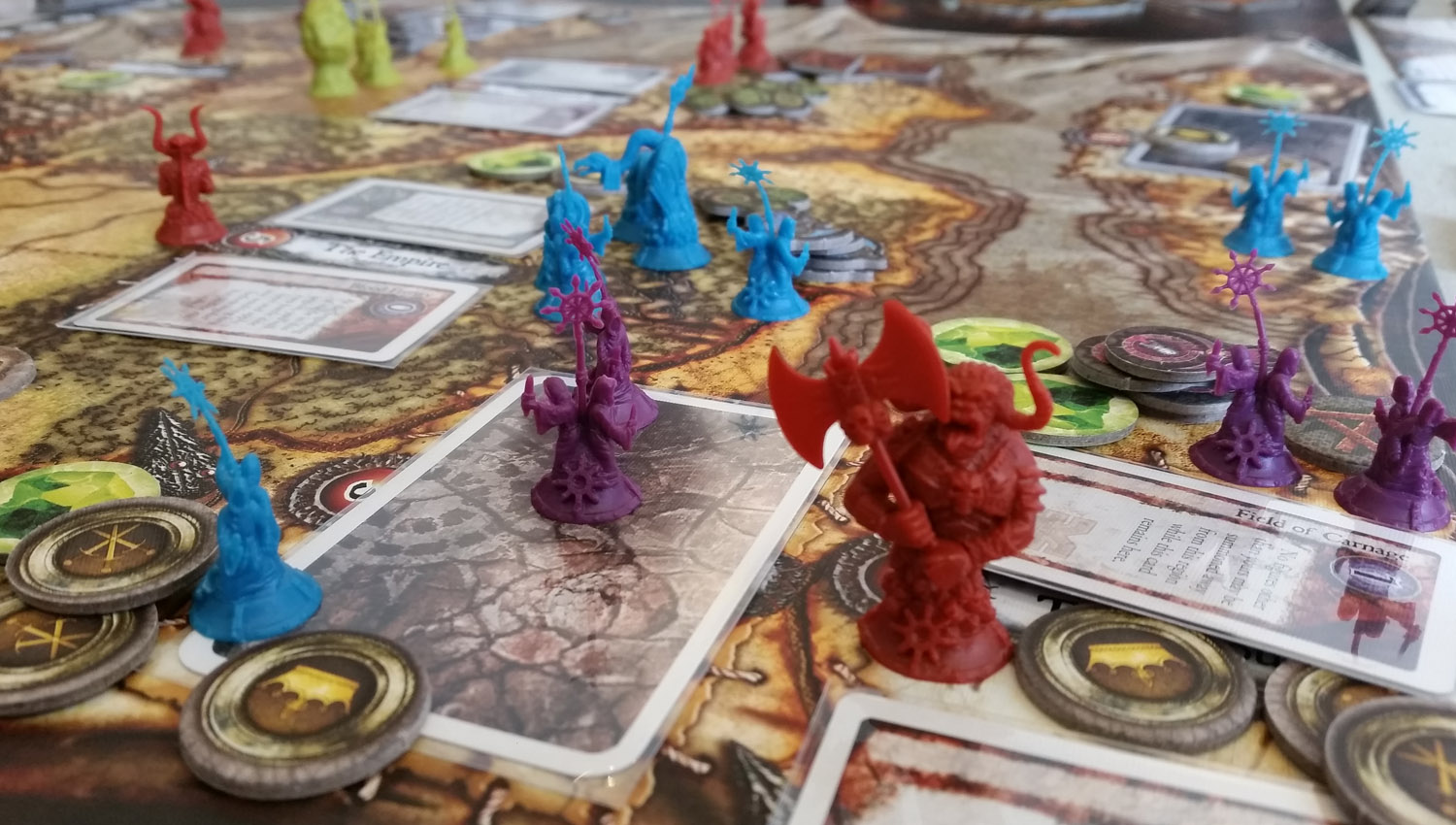
#85: CHAOS IN THE OLD WORLD
Paul: As Neil Young said: Keep on Dying in the Old World. Wow, this feels like a grandad classic now.
Quinns: The prolific Eric Lang’s spiritual precursor to Blood Rage set in the gritty Warhammer universe, where warring gods compete for domination of the map, as well as the souls of the locals. We never reviewed this one, partially because it first came out in 2009, a couple of years before SU&SD would slip onto the board game scene like a greased and noisy weasel, and partially because of a weird gripe I have with it.
You see, Chaos in the Old World is so wildly asymmetric, with each player’s Chaos God looking to win the game in such a unique way (war, pestilence, corruption of nobility), that each time I finished it I was left thinking “Phew! OK, that was weird but I’ll know better how to compete next time.” Except the game is so bizarre and unintuitive that months later, when we played again I’d forgotten everything I learned, which was an exercise in frustration.
At least my understanding of this game being stuck in a permanent state of chaos is thematically appropriate, eh?
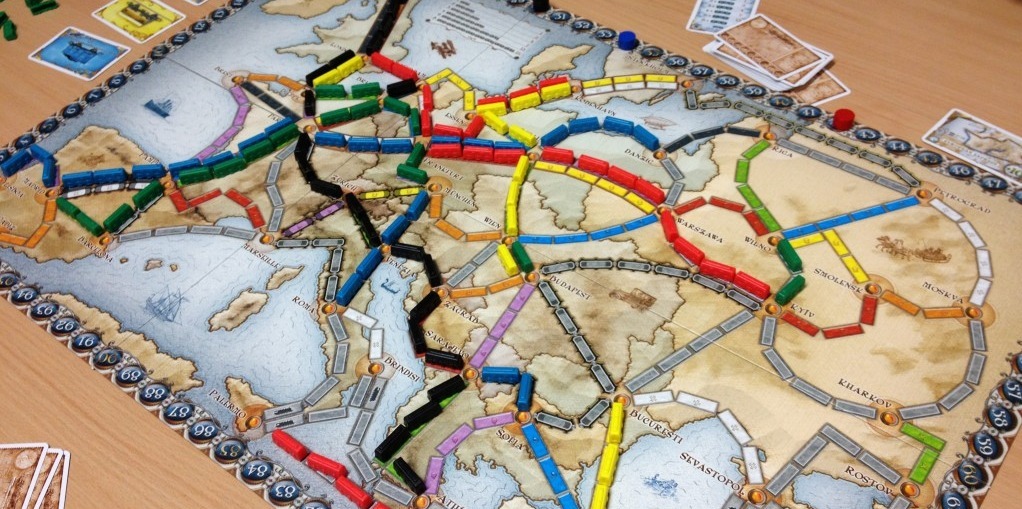
Review here
Matt: She’s got a ticket to ride, and she don’t care (about the majority of other board games available). If there’s one thing that The Beatles understood, it was the power of mass-market branding.
What we said:
Quinns: Ticket to Ride is so simple you can effortlessly play it with literally anyone, and not only that! This isn’t just a good puzzle. This is the puzzle equivalent of Brad Pitt in Snatch, it’s so lightweight, each rule running across it like a dangerous strip of sinew, and the whole thing comes together in a gorgeous body that can effortlessly slap you around.
Paul: Ticket to Ride’s strength is that anyone can enjoy it and it evades mastery, so it hits none of the lows that board games can hit. But it hits none of those highs either. Would I play some Ticket to Ride and have a decent time? Yeah, probably. Would I rather play *any other game* that Shut Up & Sit Down has got excited about? ABSOLUTELY.
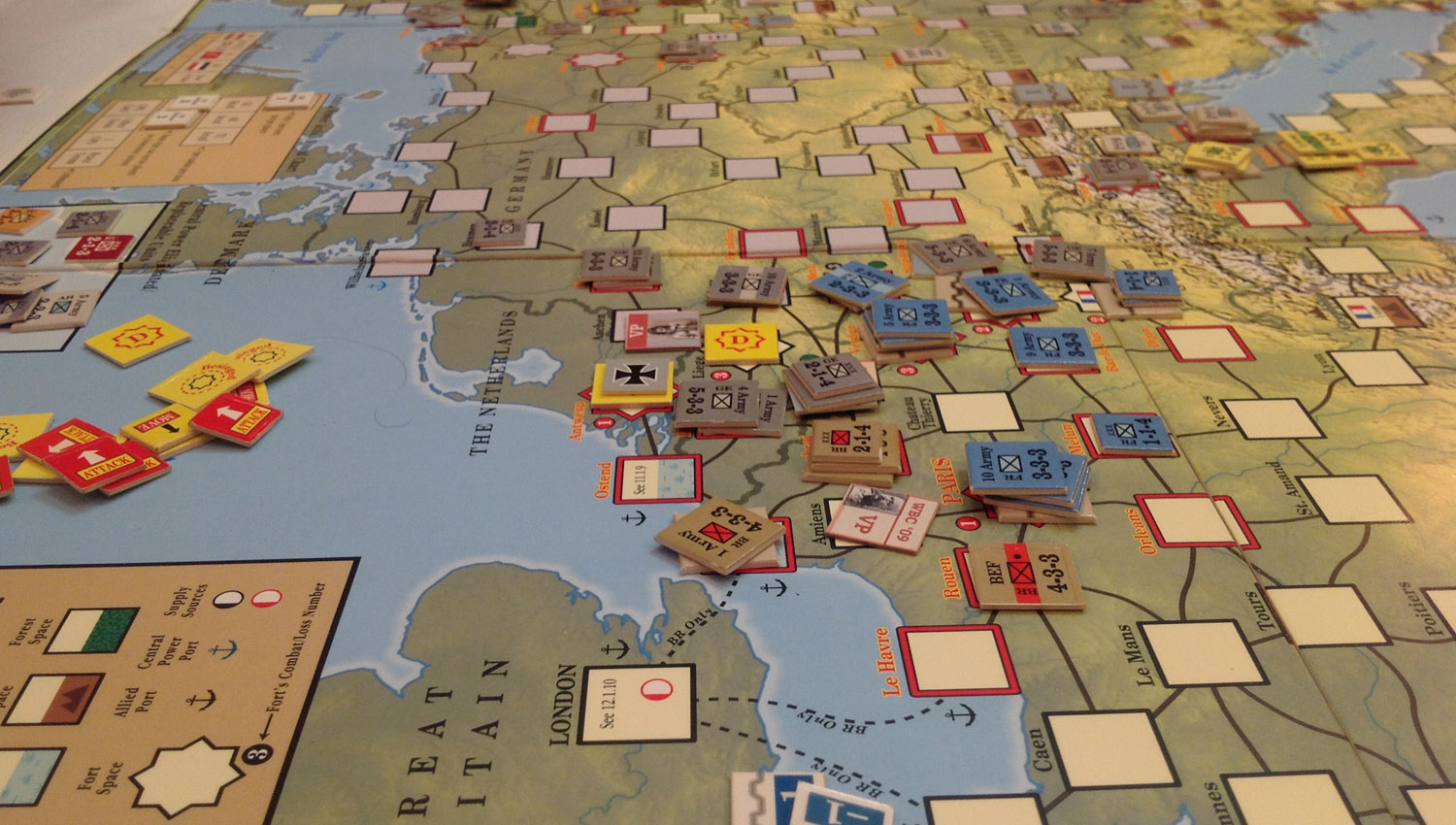
#83: PATHS OF GLORY
Paul: We have to admit, this is another gigantic game that we haven’t yet had the time or bravery to face off against. GMT’s enormous (and now pretty venerable) simulation of the First World War gives you all of Europe to spread your enormous, angry armies across.
This is a game of hundreds and hundreds of tokens, a dense deck of cards and AT LEAST FIVE HOURS WORTH OF WAR, a war packed with naval blockades and poison gas and angry, angry tanks, as two players go head-to-head for control of a continent. It’s all about carefully-timed cards, strategic savvy and definitely, definitely having a full day in which you don’t need to do anything else at all. Though you should probably at least have lunch. And some water. It’s important to remain hydrated. Particularly in a war.
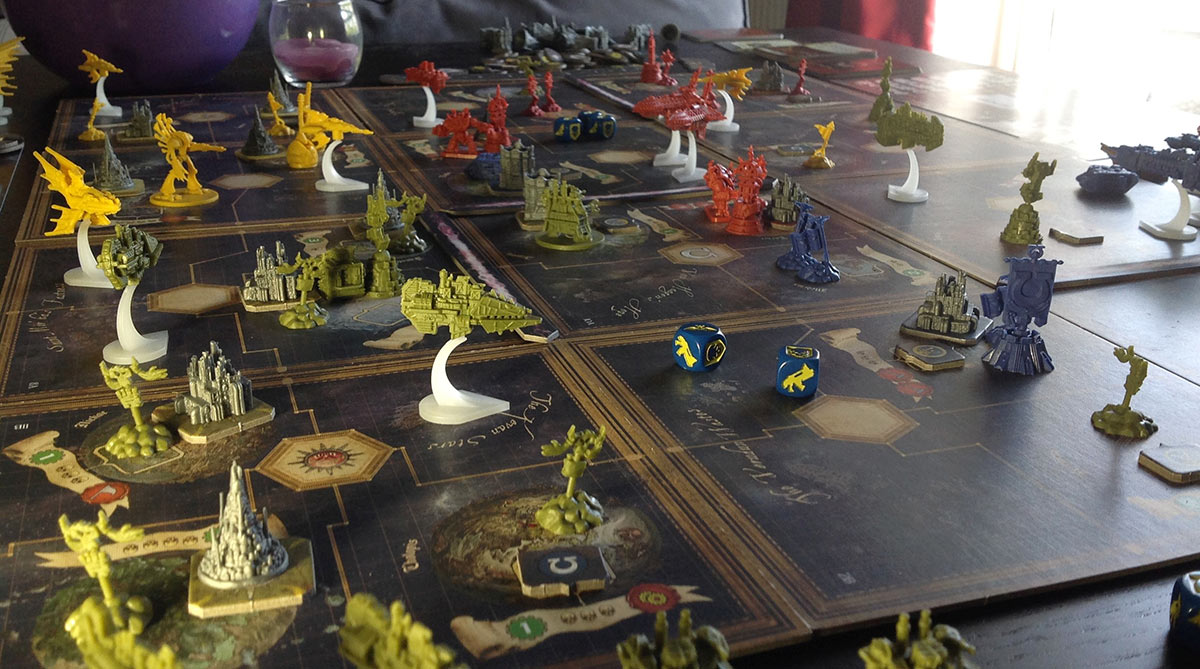
#82: FORBIDDEN STARS ![]()
Review here
Matt: The Forbidden Stars are the juiciest of all, my dear. This heavy box of endless bits conjures up a delightfully messy game of bluster and bluffing, in which wars rarely last longer than five minutes before being replaced by brand new, more important wars. Now Fantasy Flight’s lost the Games Workshop license, these stars will soon vanish from the sky. If you find a copy, pick it up! It could soon become a collector’s item.
What we said:
Quinns: In the grim darkness of the future, there should be pain, and cruelty, and hatred, all under the creeping threat of Chaos devouring the galaxy. Instead, we get a meticulously thought-out class act, where if you can handle a fifteen minute rules explanation you’ll have a great time with lots of laughter, smiles and memorable moments.
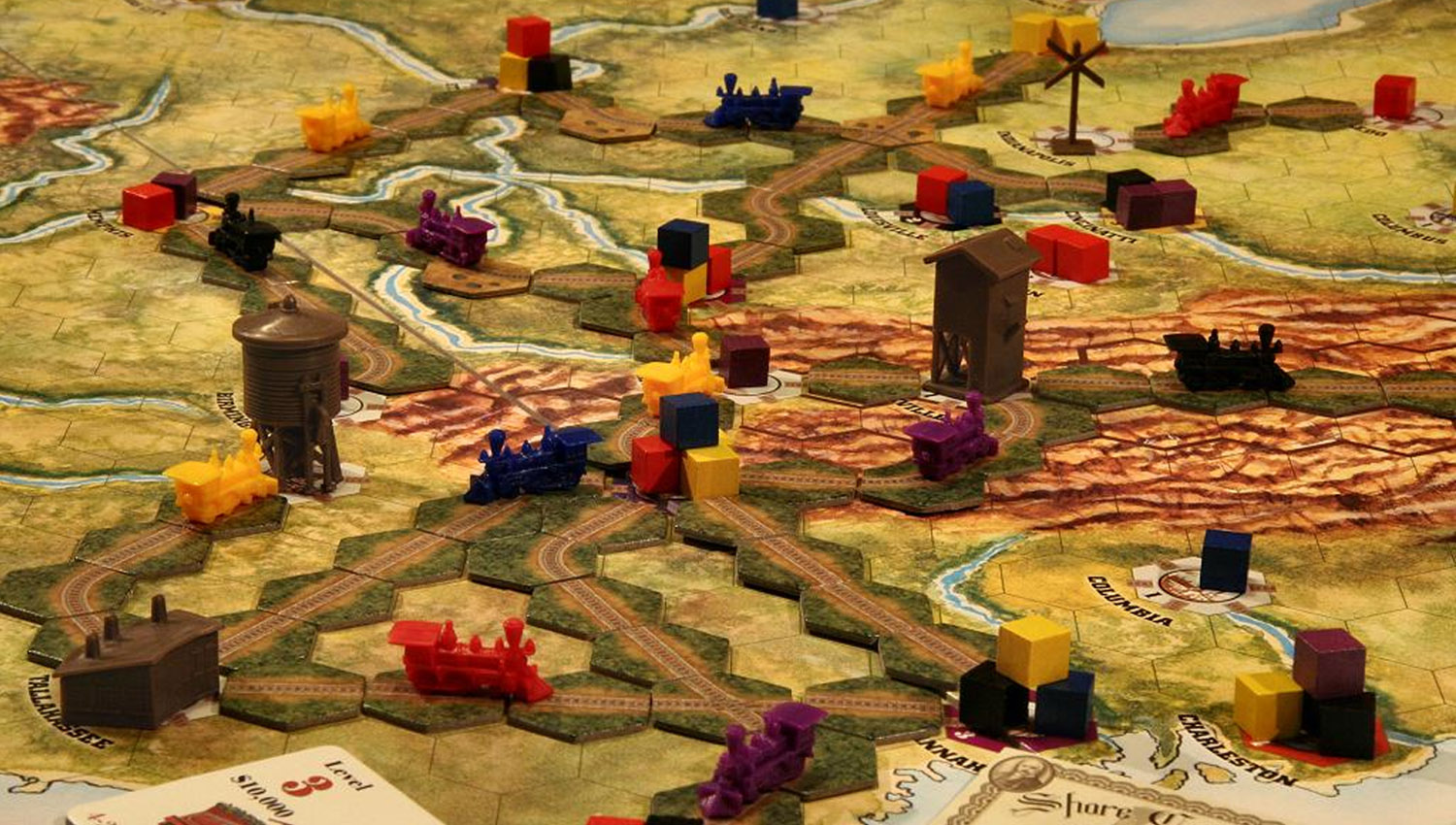
#81: RAILWAYS OF THE WORLD
Matt: Wow, railways again. Yet another example of Board Game Geek’s outrageous and brazen dedication to pro-train propaganda. How many games in the Top 100 center around the important theme of Making an Egg for your Good Friend? Exactly. Outrageous. That’s right folks, we’re back to the Age of Steam in a game that isn’t Age of Steam or Steam but Railways of the World, and guess what it’s a hexagonal-based railroad building game designed by the same man who did both Steam and Age of Steam. Wake up sheeple!!!
Honestly though, Railways of the World looks to be both massive and adorable, and I sort of want to play it a little bit simply because it has tiny plastic purple trains. It’s OK to let the conspirators win, providing they let you play with tiny purple trains.
SU&SD Takes on the BGG Top 100
100 – 8180 – 6160 – 4140 – 2120 – 1110 – 1

